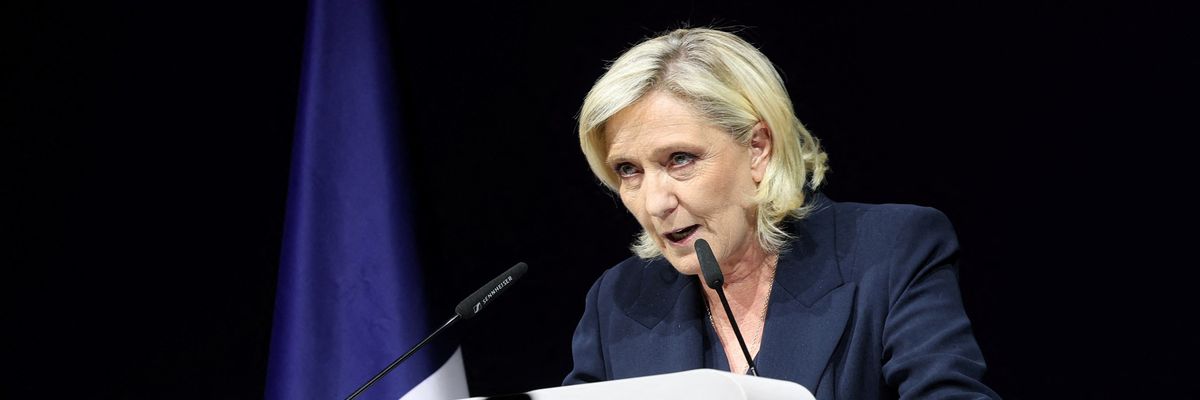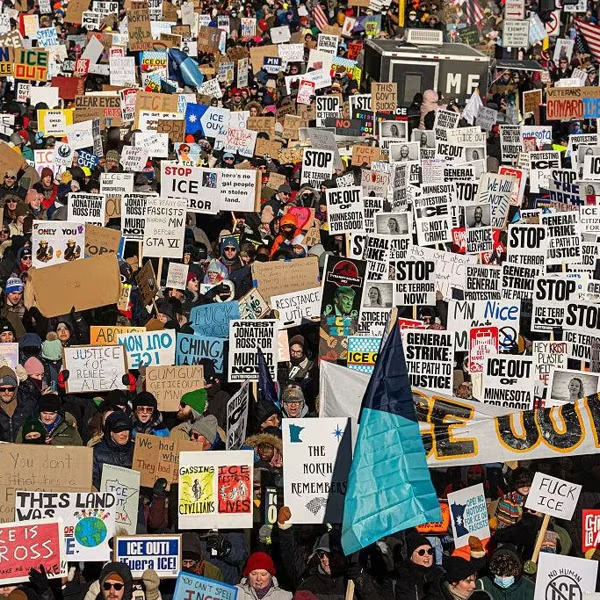
Marine Le Pen gives a speech after the first round of French parliamentary elections in Henin-Beaumont, France on June 30, 2024.
After First Round of Voting, Will France's Centrists Drop Out to Stop the Fascists?
Leftist Jean-Luc Mélenchon said his party's third-place candidates would withdraw from three-way runoffs to help prevent the far-right from seizing power.
Leaders of France's left-of-center parties vowed Sunday to withdraw their third-place candidates from runoff races in an effort to prevent Marine Le Pen's fascist National Rally from securing an absolute majority in the country's Parliament.
But will centrist candidates follow suit?
That question became critical following the first round of voting in snap parliamentary elections called by French President Emmanuel Macron last month after his party suffered a stinging defeat in European elections. Macron's decision appears to have backfired in a major way.
Le Pen's viciously xenophobic Rassemblement National (RN) prevailed in round one on Sunday, winning 33.2% of the vote, while the Nouveau Front Populaire (NFP)—an alliance of left-of-center parties formed ahead of the snap elections to counter the far-right—came in second at 28%. Macron's centrist Ensemble coalition landed in third with 22.4% of the vote.
The decisive second round will be held on July 7, and efforts to stop Le Pen's party from seizing outright control of the National Assembly likely hinge on electoral cooperation between the center and the left. The Financial Times calculated that the first round of voting "produced more than 300 three-way runoffs... an unprecedented number, although the final figure will depend on how many candidates drop out."
In races qualifying for runoffs, according to FT, Macron's Ensemble alliance had 95 third-place candidates after round one while the left-of-center NFP had 129.
Speaking to supporters Sunday, leftist La France Insoumise (LFI) leader Jean-Luc Mélenchon said his party would withdraw candidates from races in which they placed third and the far-right NR was in the lead—a vow that the heads of other left-wing parties echoed.
"Our instructions are simple, direct, and clear: not one vote, not one more seat for the RN," said Mélenchon.
"The question that should be asked of every Macronist in the next couple days: Does this line extend to La France Insoumise or not? Right now, it's not clear."
The centrists were much less direct about their intentions.
French Prime Minister Gabriel Attal, who acknowledged the far-right is "at the gates of power," said the centrist alliance would withdraw candidates from runoffs if their presence would hinder "another candidate—who, like us—defends the values of the Republic," without specifically saying whether he includes leftist LFI candidates in that category.
"The question that should be asked of every Macronist in the next couple days: Does this line extend to La France Insoumise or not? Right now, it's not clear," France-based journalist Cole Stangler wrote Sunday.
Macron similarly urged voters to back candidates who are "clearly republican and democratic." But as The Washington Post observed, the French president "has at times portrayed the far-left as equally dangerous as the far-right," raising concerns that centrists could allow the far-right to win close races by splitting votes in three-way runoffs that include candidates from Mélenchon's LFI.
As Reuters reported, French Finance Minister Bruno Le Maire "ruled out calling on voters to choose an LFI candidate" in a radio interview—a position that one senior Greens member denounced as "cowardly and privileged."
One government minister, Roland Lescure, did explicitly urge "all voters to block the extreme right without hesitation by voting for the best-placed alternative candidate," even if it's an LFI candidate.
"The real danger for France today is an absolute majority National Rally," said Lescure. "And we must do everything to prevent it."
An Urgent Message From Our Co-Founder
Dear Common Dreams reader, The U.S. is on a fast track to authoritarianism like nothing I've ever seen. Meanwhile, corporate news outlets are utterly capitulating to Trump, twisting their coverage to avoid drawing his ire while lining up to stuff cash in his pockets. That's why I believe that Common Dreams is doing the best and most consequential reporting that we've ever done. Our small but mighty team is a progressive reporting powerhouse, covering the news every day that the corporate media never will. Our mission has always been simple: To inform. To inspire. And to ignite change for the common good. Now here's the key piece that I want all our readers to understand: None of this would be possible without your financial support. That's not just some fundraising cliche. It's the absolute and literal truth. We don't accept corporate advertising and never will. We don't have a paywall because we don't think people should be blocked from critical news based on their ability to pay. Everything we do is funded by the donations of readers like you. Will you donate now to help power the nonprofit, independent reporting of Common Dreams? Thank you for being a vital member of our community. Together, we can keep independent journalism alive when it’s needed most. - Craig Brown, Co-founder |
Leaders of France's left-of-center parties vowed Sunday to withdraw their third-place candidates from runoff races in an effort to prevent Marine Le Pen's fascist National Rally from securing an absolute majority in the country's Parliament.
But will centrist candidates follow suit?
That question became critical following the first round of voting in snap parliamentary elections called by French President Emmanuel Macron last month after his party suffered a stinging defeat in European elections. Macron's decision appears to have backfired in a major way.
Le Pen's viciously xenophobic Rassemblement National (RN) prevailed in round one on Sunday, winning 33.2% of the vote, while the Nouveau Front Populaire (NFP)—an alliance of left-of-center parties formed ahead of the snap elections to counter the far-right—came in second at 28%. Macron's centrist Ensemble coalition landed in third with 22.4% of the vote.
The decisive second round will be held on July 7, and efforts to stop Le Pen's party from seizing outright control of the National Assembly likely hinge on electoral cooperation between the center and the left. The Financial Times calculated that the first round of voting "produced more than 300 three-way runoffs... an unprecedented number, although the final figure will depend on how many candidates drop out."
In races qualifying for runoffs, according to FT, Macron's Ensemble alliance had 95 third-place candidates after round one while the left-of-center NFP had 129.
Speaking to supporters Sunday, leftist La France Insoumise (LFI) leader Jean-Luc Mélenchon said his party would withdraw candidates from races in which they placed third and the far-right NR was in the lead—a vow that the heads of other left-wing parties echoed.
"Our instructions are simple, direct, and clear: not one vote, not one more seat for the RN," said Mélenchon.
"The question that should be asked of every Macronist in the next couple days: Does this line extend to La France Insoumise or not? Right now, it's not clear."
The centrists were much less direct about their intentions.
French Prime Minister Gabriel Attal, who acknowledged the far-right is "at the gates of power," said the centrist alliance would withdraw candidates from runoffs if their presence would hinder "another candidate—who, like us—defends the values of the Republic," without specifically saying whether he includes leftist LFI candidates in that category.
"The question that should be asked of every Macronist in the next couple days: Does this line extend to La France Insoumise or not? Right now, it's not clear," France-based journalist Cole Stangler wrote Sunday.
Macron similarly urged voters to back candidates who are "clearly republican and democratic." But as The Washington Post observed, the French president "has at times portrayed the far-left as equally dangerous as the far-right," raising concerns that centrists could allow the far-right to win close races by splitting votes in three-way runoffs that include candidates from Mélenchon's LFI.
As Reuters reported, French Finance Minister Bruno Le Maire "ruled out calling on voters to choose an LFI candidate" in a radio interview—a position that one senior Greens member denounced as "cowardly and privileged."
One government minister, Roland Lescure, did explicitly urge "all voters to block the extreme right without hesitation by voting for the best-placed alternative candidate," even if it's an LFI candidate.
"The real danger for France today is an absolute majority National Rally," said Lescure. "And we must do everything to prevent it."
Leaders of France's left-of-center parties vowed Sunday to withdraw their third-place candidates from runoff races in an effort to prevent Marine Le Pen's fascist National Rally from securing an absolute majority in the country's Parliament.
But will centrist candidates follow suit?
That question became critical following the first round of voting in snap parliamentary elections called by French President Emmanuel Macron last month after his party suffered a stinging defeat in European elections. Macron's decision appears to have backfired in a major way.
Le Pen's viciously xenophobic Rassemblement National (RN) prevailed in round one on Sunday, winning 33.2% of the vote, while the Nouveau Front Populaire (NFP)—an alliance of left-of-center parties formed ahead of the snap elections to counter the far-right—came in second at 28%. Macron's centrist Ensemble coalition landed in third with 22.4% of the vote.
The decisive second round will be held on July 7, and efforts to stop Le Pen's party from seizing outright control of the National Assembly likely hinge on electoral cooperation between the center and the left. The Financial Times calculated that the first round of voting "produced more than 300 three-way runoffs... an unprecedented number, although the final figure will depend on how many candidates drop out."
In races qualifying for runoffs, according to FT, Macron's Ensemble alliance had 95 third-place candidates after round one while the left-of-center NFP had 129.
Speaking to supporters Sunday, leftist La France Insoumise (LFI) leader Jean-Luc Mélenchon said his party would withdraw candidates from races in which they placed third and the far-right NR was in the lead—a vow that the heads of other left-wing parties echoed.
"Our instructions are simple, direct, and clear: not one vote, not one more seat for the RN," said Mélenchon.
"The question that should be asked of every Macronist in the next couple days: Does this line extend to La France Insoumise or not? Right now, it's not clear."
The centrists were much less direct about their intentions.
French Prime Minister Gabriel Attal, who acknowledged the far-right is "at the gates of power," said the centrist alliance would withdraw candidates from runoffs if their presence would hinder "another candidate—who, like us—defends the values of the Republic," without specifically saying whether he includes leftist LFI candidates in that category.
"The question that should be asked of every Macronist in the next couple days: Does this line extend to La France Insoumise or not? Right now, it's not clear," France-based journalist Cole Stangler wrote Sunday.
Macron similarly urged voters to back candidates who are "clearly republican and democratic." But as The Washington Post observed, the French president "has at times portrayed the far-left as equally dangerous as the far-right," raising concerns that centrists could allow the far-right to win close races by splitting votes in three-way runoffs that include candidates from Mélenchon's LFI.
As Reuters reported, French Finance Minister Bruno Le Maire "ruled out calling on voters to choose an LFI candidate" in a radio interview—a position that one senior Greens member denounced as "cowardly and privileged."
One government minister, Roland Lescure, did explicitly urge "all voters to block the extreme right without hesitation by voting for the best-placed alternative candidate," even if it's an LFI candidate.
"The real danger for France today is an absolute majority National Rally," said Lescure. "And we must do everything to prevent it."

